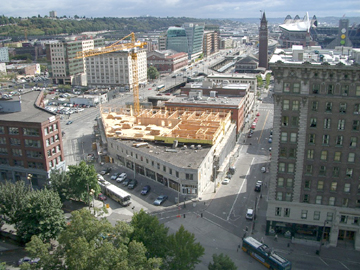50 Units of Housing
Pro Forma
(financial prospectus)
Kaplan Building Mixed-Use Housing/Commercial Space Costs:
|
50 Units of Housing |
First mortgage: $5,290,000
Purchase Price Credit: $0
Tax Credit Equity: $3,559,528
City of Seattle Office of Housing Fund: $2,420,000
Washington State Housing Trust Fund: $1,000,000
Sponsor/City of Seattle Loan: $820,000
Deferred Developer Fee: $444,000
TOTAL: $13,533,528
Tashiro Building Commercial Space:
First Mortgage: $1,200,000
Purchase Price Credit (below market lease): $1,500,000
Tax Credit Equity: $0
TOTAL: $2,700,000
PROJECT TOTAL: $16,233,528
The various forms of funding secured by Artspace for the Tashiro Kaplan renovation project encompass several different forms of public assistance and tax credits. The purchase price credit of 1.5 million dollars below market value indicates that the City of Seattle was the previous owner of the property and was willing accept a 'write down'. A write down occurs when property is sold below market value as a subsidy prompted by the attractiveness of this type of renovation to Seattle. The City of Seattle owned the Tashiro Building, but not the Kaplan Building, which is why the value of the price credit is zero in that case.
The approximately 3.6 million dollar tax credit equity obtained for the Kaplan project is important because it retains a real cash value and can be sold to others. The tax credit was earned in order to encourage the renovation plan to include preservation of the historical facade of the Kaplan building. If Artspace chooses to sell the tax credit equity, they will gain access to the cash, but at a loss of approximately 20% of the original value.
The deferred developer fee of 444, 000 dollars prevents Artspace from having either having to pay the developer until the end of the grace period or the city is forgiving the usual system development charges. The system development charges (or impact fees) usually are levied for renovation or new construction projects to fund common goods: schools, sewers, parks, etc.

Financing Tashiro
HUD 220
HUD 220 is a federal housing assistance program, through the U.S. Department of Housing and Urban Development, that insures mortgages for multi-family residential structures in urban renewal areas and other local government revitalization projects. The mortgage insurance is intended for renovation of existing buildings for housing purposes. HUD provided an insured mortgage note of $5.15 million, nearly one third of the total project cost. The projected revenue sales in the commercial space of lobby, makes Tashiro a highly secure project for the HUD to guarantee. In addition to the benefits of the affordable housing provided by the project itself, HUD estimates Tashiro will be a catalyst for other mixed-use building renovations within the neighborhood.
Allen Foundation for the Arts & Artist Trust
Microsoft co-founder Paul G. Allen has set up a foundation specifically to provide grants for Artist Trust and other associated endowments. The Allen Foundation provided Artist Trust with a $40,000 grant specifically to be used for Tashiro Kaplan renovations. The Allen Foundation is the primary private benefactor for the project, filling in the gap between public funding and private donations.
City of Seattle and Washington State:
Both the City of Seattle and Washington State provided the majority of public funding for the Tashiro Kaplan renovation project. Most of the assistance came in terms of favorable tax credits, property sale terms, and deferred impact charges. Both the state and city were responsible for making this project financially viable.
Home Page Introduction Artspace Projects Inc Pioneer Square
Artist Housing Needs First Thursday Artwalk Application Process